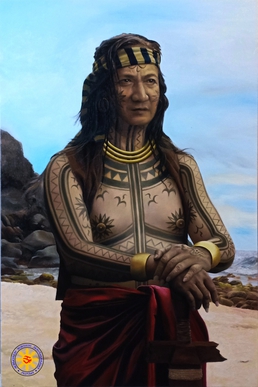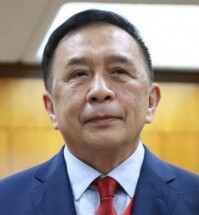
The Armed Forces of the Philippines (AFP) are the military forces of the Philippines. It consists of three main service branches; the Army, the Air Force, and the Navy. The President of the Philippines is the Commander-in-Chief of the AFP and forms military policy with the Department of National Defense, an executive department acting as the principal organ by which military policy is carried out, while the Chief of Staff of the Armed Forces of the Philippines serves as the overall commander and the highest-ranking officer in the AFP.

The Autonomous Region in Muslim Mindanao was an autonomous region of the Philippines, located in the Mindanao island group of the Philippines, that consisted of five predominantly Muslim provinces: Basilan, Lanao del Sur, Maguindanao, Sulu, and Tawi-Tawi. It was the only region that had its own government. The region's de facto seat of government was Cotabato City, although this self-governing city was outside its jurisdiction.

Lapulapu or Lapu-Lapu, whose name was first recorded as Çilapulapu, was a datu (chief) of Mactan, an island now part of the Philippines. Lapulapu is known for the 1521 Battle of Mactan, where he and his men defeated Spanish forces led by Portuguese explorer Ferdinand Magellan and his native allies Rajah Humabon and Datu Zula. Magellan's death in battle ended his voyage of circumnavigation and delayed the Spanish occupation of the islands by over forty years until the expedition of Miguel López de Legazpi in 1564.

Mindanao State University is a state university system in the city of Marawi, Philippines. It is the first state university in Mindanao, Philippines, established through Republic Act 1387. It is the second state-sponsored institution in the country, following the University of the Philippines.

The orders and decorations conferred upon civilians and military personnel in the Republic of the Philippines are listed by orders of precedence. Philippine civilian orders and decorations are conferred by the President of the Philippines in his or her capacity as head of state. In certain instances, the conferment of certain orders and decorations requires the concurrence of the Congress of the Philippines, or of certain advisory bodies.

The Medal of Valor is the Armed Forces of the Philippines' highest military honor awarded for a conspicuous deed of personal bravery or self-sacrifice above and beyond the call of duty that distinguishes the recipient from his comrades. It is defined in the Philippine Army Awards and Decorations reference material FC 1–0062, itself adapted from the Armed Forces of the Philippines Awards and Decorations Handbook, Second Edition published in 1997, as an award for "heroism in combat" and is foremost in the order of precedence of awards and decorations of the Armed Forces of the Philippines.

Rodrigo Roa Duterte, also known as Digong, Rody, and by the initials DU30 and PRRD, is a Filipino lawyer and politician who served as the 16th president of the Philippines from 2016 to 2022. He is the chairperson of Partido Demokratiko Pilipino, the ruling political party in the Philippines during his presidency. Duterte is the first president of the Philippines to be from Mindanao, and is the oldest person to assume office, beginning his term at age 71.

The Order of Lakandula is one of the highest civilian orders of the Philippines, established on September 19, 2003. It is awarded for political and civic merit and in memory of Lakandula’s dedication to the responsibilities of leadership, prudence, fortitude, courage and resolve in the service of one’s people.

The National Youth Commission, also known as the NYC, is a government agency in the Philippines that specifically addresses issues surrounding the Filipino youth. It was founded on June 30, 1995, via Republic Act 8044 or the "Youth in Nation-Building Act of 1995".

Hermogenes Cendaña Esperon Jr. is a retired Philippine Army general who served as the National Security Adviser in the Cabinet of President Rodrigo Duterte from 2016 to 2022. He was the Chief of Staff of the Armed Forces of the Philippines from 2006 to 2008 and Commanding General of the Philippine Army from 2005 to 2006 under President Gloria Macapagal Arroyo. After his retirement from the military, he served in Arroyo's administration as the Presidential Adviser on the Peace Process and later as the head of the Presidential Management Staff.

Saidamen Balt Pangarungan is a Filipino businessman, lawyer and politician who previously served as the ad interim Chairman of the Commission on Elections from March–June 2022. He previously served as the secretary of the National Commission on Muslim Filipinos in the Duterte administration, and was the governor of Lanao del Sur from 1988 to 1992.

Eduardo Manahan Año is a Filipino public official and retired general of the Philippine Army who currently serves as the National Security Adviser under the administration of President Bongbong Marcos since 2023. He previously served as Secretary of the Interior and Local Government in the Cabinet of President Rodrigo Duterte from 2018 to 2022, the Chief of Staff of the Armed Forces of the Philippines from 2016 to 2017, and the Commanding General of the Philippine Army from 2015 to 2016. At the onset of the COVID-19 pandemic in the Philippines, Año, along with the rest of the Philippine government's Cabinet Secretaries, became part of the Inter-Agency Task Force for the Management of Emerging Infectious Diseases, a task force formed to advise the President on the strategies which would effectively manage the spread of COVID-19 in the country.

Delfin Negrillo Lorenzana, OLH, KGOR is a retired Philippine Army general who served as Chairman of the Bases Conversion and Development Authority from 2022 until September 2024. He previously served as Secretary of National Defense in the Cabinet of President Rodrigo Duterte from 2016 to 2022. He served in the Philippine Army from 1973 to 2004.

Glorioso Ventura Miranda is a retired Filipino soldier who is the former Vice Chief of Staff of the Armed Forces of the Philippines. He served as acting Chief of Staff of the Armed Forces of the Philippines from April 22 to June 30, 2016. Before becoming the 46th Vice Chief of Staff of the Armed Forces last March 8, 2016, he was the Commanding General of the AFP Northern Luzon Command from August 13, 2015. He was also the former commander of the 7th Infantry Division. He is part of the Matikas Class of the Philippine Military Academy of 1983.

The siege of Marawi, also known as the Marawi crisis and the Battle of Marawi, was a five-month-long armed conflict in Marawi, Philippines, that started on May 23, 2017, between Philippine government security forces against militants affiliated with the Islamic State (IS), including the Maute and Abu Sayyaf Salafi jihadist groups. The battle also became the longest urban battle in the modern history of the Philippines.

Proclamation No. 216 was the 2017 proclamation of martial law and suspension of the privilege of the writ of habeas corpus in the whole of Mindanao amid clashes between government forces and Maute group terrorists in Marawi, issued by Philippine President Rodrigo Duterte on May 23, 2017. The state of martial law was extended thrice by Congress at the request of Duterte, citing necessity to quell hostile activities perpetrated by terrorist groups, and ended with the third extension lapsing on December 31, 2019.

Carlito Guancing Galvez Jr. is a retired Philippine Army general currently serving as Presidential Adviser on Peace, Reconciliation and Unity (PAPRU) since 2023.

The 2019 Indanan bombings occurred on 28 June 2019, when two suicide bombers detonated their explosives in two areas of a military camp in Indanan, Sulu, Philippines killing three soldiers and three civilians. The Philippine military confirmed it was two suicide bombers that caused the attack. They also believed that the attack was conducted in a similar manner to an attack on a cathedral in Jolo in January 2019. The military also blames the Abu Sayyaf for the earlier attack.
The following are the events in related to Philippine law in 2017. This includes developments in criminal investigations of national notability.

Romeo Saturnino Brawner Jr. is a Philippine Army general who has served as the 60th Chief of Staff of the Armed Forces of the Philippines since July 21, 2023. Prior to his appointment to the post, Brawner previously served as the 64th Commanding General of the Philippine Army.




















